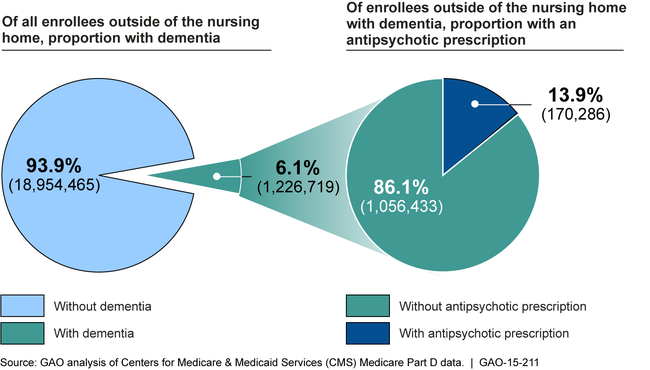Antipsychotic Drug Use: HHS Has Initiatives to Reduce Use among Older Adults in Nursing Homes, but Should Expand Efforts to Other Settings
Highlights
What GAO Found
Antipsychotic drugs are frequently prescribed to older adults with dementia. GAO's analysis found that about one-third of older adults with dementia who spent more than 100 days in a nursing home in 2012 were prescribed an antipsychotic, according to data from Medicare's prescription drug program, also known as Medicare Part D. Among Medicare Part D enrollees with dementia living outside of a nursing home that same year, about 14 percent were prescribed an antipsychotic. (See figure.)
Proportion of Older Adult Medicare Part D Enrollees Outside of the Nursing Home Diagnosed with Dementia Who Were Prescribed an Antipsychotic in 2012

Note: GAO excluded individuals diagnosed with schizophrenia or bipolar disorder because the Food and Drug Administration (FDA) has approved certain antipsychotic drugs for the treatment of these conditions.
Experts and research identified patient agitation or delusions, as well as certain setting-specific characteristics, as factors contributing to the prescribing of antipsychotics to older adults. For example, experts GAO spoke with noted that antipsychotic drugs are often initiated in hospital settings and carried over when older adults are admitted to a nursing home. In addition, experts and research have reported that nursing home staff levels, particularly low staff levels, lead to higher antipsychotic drug use.
Agencies within the Department of Health and Human Services (HHS) have taken several actions to address antipsychotic drug use by older adults in nursing homes, as described in HHS's National Alzheimer's Plan; however, none have been directed to settings outside of nursing homes, such as assisted living facilities or individuals' homes. While the National Alzheimer's Plan has a goal to improve dementia care for all individuals regardless of residence, HHS officials said that efforts to reduce antipsychotic use have not focused on care settings outside nursing homes, though HHS has done work to support family caregivers in general. Stakeholders GAO spoke to indicated that educational efforts similar to those provided for nursing homes should be extended to other settings. Extending educational efforts to caregivers and providers outside of the nursing home could help lower the use of antipsychotics among older adults with dementia living both inside and outside of nursing homes.
Why GAO Did This Study
Dementia affects millions of older adults, causing behavioral symptoms such as mood changes, loss of communication, and agitation. Concerns have been raised about the use of antipsychotic drugs to address the behavioral symptoms of the disease, primarily due to the FDA's boxed warning that these drugs may cause an increased risk of death when used by older adults with dementia and the drugs are not approved for this use.
GAO was asked to examine psychotropic drug prescribing for older adult nursing home residents. In this report, GAO examined (1) to what extent antipsychotic drugs are prescribed for older adults with dementia living inside and outside nursing homes, (2) what is known from selected experts and published research about factors contributing to the such prescribing, and (3) to what extent HHS has taken action to reduce the use of antipsychotic drugs by older adults with dementia. GAO analyzed multiple data sources including 2012 Medicare Part D drug event claims and nursing home assessment data; reviewed research and relevant federal guidance and regulations; and interviewed experts and HHS officials.
Recommendations
GAO recommends that HHS expand its outreach and educational efforts aimed at reducing antipsychotic drug use among older adults with dementia to include those residing outside of nursing homes by updating the National Alzheimer's Plan. HHS concurred with this recommendation.
Recommendations for Executive Action
| Agency Affected | Recommendation | Status |
|---|---|---|
| Department of Health and Human Services | The Secretary of HHS should expand its outreach and educational efforts aimed at reducing antipsychotic drug use among older adults with dementia to include those residing outside of nursing homes by updating the National Alzheimer's Plan. |
In its 2019 update to the National Plan to Address Alzheimer's Disease, CMS noted that it worked with the Substance Abuse and Mental Health Services Administration (SAMHSA) to issue guidance on antipsychotic prescribing in the community. Specifically, in April of 2019, SAMHSA issued guidance on community prescribing that covers principles of care for community residing older adults and individuals with disabilities-including assessment, goals of care, and care plans for pharmacologic and non-pharmacologic approaches to care. The guidance also contains links to other relevant resources.
|
